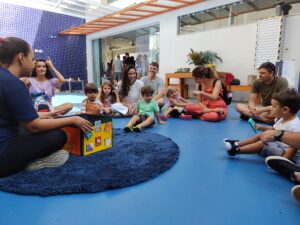When it comes to creating a truly inclusive and welcoming educational environment, open dialogue between schools and families plays a key role. For many parents, gaining insight into their child’s school day is more than just a curiosity; it’s a way for them to feel connected and involved in education.
Parents often express a genuine desire to know more about what happens during the school day, but are challenged by the lack of information shared by their children.
Establishing a dialogue with the child, asking about how their day was, what they learned, how their relationships were with their classmates and other everyday school issues allows parents to have a better assessment of the school environment and their child’s experience in it. environment.
Some questions can stimulate conversation, such as: What was the best thing that happened at school today?; What did you do creatively?; Did you meet anyone new at school today?; Who did you play with? What was your best discovery? Did you feel something special today?
For older children, you can provoke dialogue with the following questions: Rate your day on a scale of 1-10. Tell us the two main events of today at school. What are you reading? What was the hardest rule to follow today? If you could change one thing about your day, what would it be?
Remember to ask a few questions a day so that this dynamic becomes increasingly pleasurable and fun. This type of regular dialogue helps strengthen the bond between parents and children and allows parents to closely monitor their children’s school life, offering support and guidance when necessary.
For families of children who still do not express themselves verbally, there are meetings with the school, portfolios and reports sent periodically, the Edu Agenda, publications on social networks, and also another valuable clue: everyday games.
Observing the games and activities children do at home can provide valuable insights into what they are learning at school.
Refining their gaze to identify new things and skills acquired in the school space, such as stacking blocks in different ways or imitating specific gestures, can indicate that they are exploring and internalizing concepts learned at school.
Strengthening the school-family partnership involves not only receiving formal information and updates, but also developing a deeper, more contextualized understanding of children’s educational experiences. By taking a holistic approach to monitoring and supporting their children’s development, parents can play an active and meaningful role throughout their school journey.

